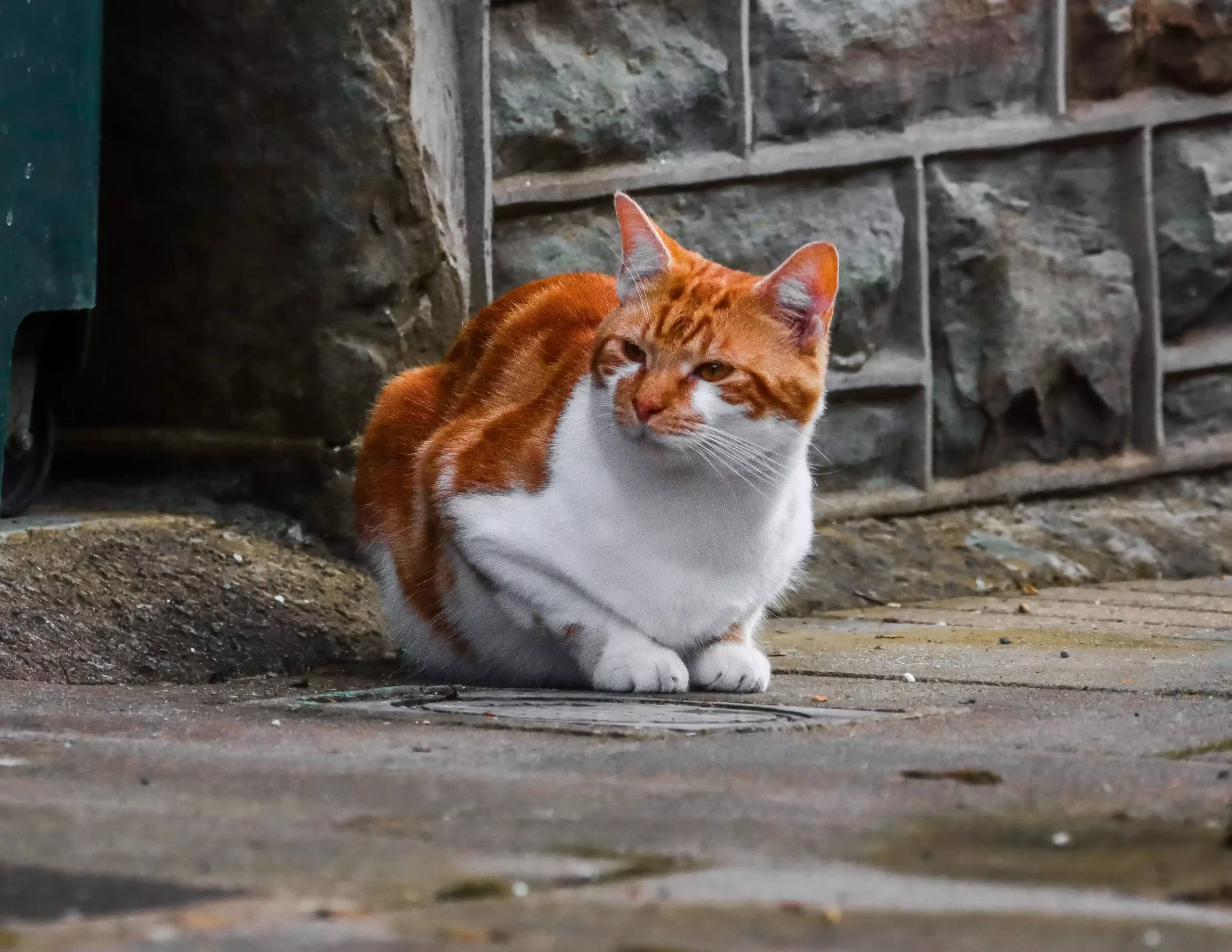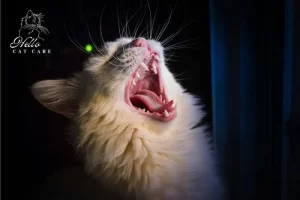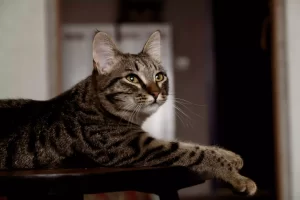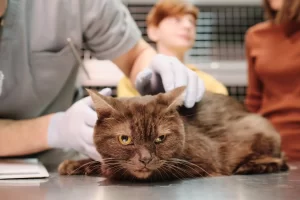This post may have affiliate links and as an Amazon Associate we earn from qualifying purchases.
Feline obesity often gets the spotlight, but being underweight is an equally serious issue, especially after trauma, surgery, or illness. Helping a cat gain weight safely requires the proper diet, feeding routine, and addressing underlying causes like hyperthyroidism, diabetes, infections, dental disease, or kidney issues. Weight loss exceeding 10% of a cat’s normal weight, often accompanied by symptoms like vomiting, poor coat condition, or appetite changes, signals a need for veterinary attention. Achieving a healthy weight is vital for overall well-being and proper organ fun.
Senior cats losing weight is usually a sign of an underlying health issue. Before attempting to help your cat gain weight, it’s crucial to identify the cause of the weight loss. Weight loss can result from various underlying health issues, including hyperthyroidism, diabetes, kidney disease, infections, parasites, or conditions like inflammatory bowel disease and cancer.
Why do cats lose weight?
First, we must understand that weight loss in cats can have various underlying causes. In our practice, weight loss in cats is less common; we often see obese cats instead. However, if your cat is thin and there’s no apparent outward reason, it’s essential to rule out different potential causes. It’s not always about worms, so let’s explore some of the most common reasons for weight loss in cats and how to address them.
Parasites.
If it’s a young cat, parasites may be to blame. It’s essential to check for worms, and the best way to do that is by bringing a fresh stool sample to your veterinarian. Common parasites in cats include Giardia, coccidia, whipworms, roundworms, and hookworms.
The Role of Thyroid Testing.
Weight loss in cats may be linked to hyperthyroidism, which requires a specific blood test to diagnose. Standard blood panels often don’t include this test. Hyperthyroidism typically causes a cat’s metabolic rate to skyrocket, leading to rapid weight loss despite an increased appetite. Some symptoms include:
- Overeating but losing weight.
- Increased energy, often with nighttime restlessness.
- Soft stools or changes in vocalization.
Hyperthyroidism
If your cat is older, hyperthyroidism could be causing the weight loss. This condition occurs when the thyroid gland becomes overactive, increasing the metabolic rate and causing the body to work overtime. As a result, the cat loses weight despite eating normally, as the body uses energy too quickly. Symptoms of hyperthyroidism include excessive hunger, rapid weight loss, and being unusually thin despite consuming large amounts of food. A blood sample is necessary to diagnose hyperthyroidism.
Hyperthyroidism: A Treatable Condition.
There are several treatment options:
- Prescription Food: Hill’s Y/D is an iodine-deficient diet that can regulate thyroid activity if fed exclusively.
- Medication: Anti-thyroid medication, available as a pill, liquid, or transdermal cream, is a common approach.
- Radioactive Iodine Therapy: A one-time treatment that destroys the overactive thyroid issue. Though expensive, it’s highly effective.
- Surgery: Removing the thyroid gland is rarely done now due to the availability of less invasive options.
Left untreated, hyperthyroidism can lead to serious complications, such as heart damage or hypertrophic cardiomyopathy.
Diabetes.
Diabetes can also cause weight loss in cats. In the early stages, cats often experience high hunger levels, leading them to eat more, but their insulin isn’t working correctly, so blood sugar isn’t absorbed into cells. This prevents the cat from gaining weight and causes weight loss. It’s important to check blood glucose and urine samples to confirm this diagnosis, and we need to be cautious and thorough when diagnosing diabetes in cats.
Infections.
Infections such as cat flu, herpes virus, or feline infectious peritonitis (FIP) can cause weight loss. Cats with infections often experience nasal discharge, which reduces their sense of smell and appetite. This can lead to them not eating enough and losing weight over time.
Inflammatory Bowel Disease (IBD) and Intestinal Cancer.
These conditions affect the intestines, disrupting proper digestion and nutrient absorption. As a result, the cat loses weight, though they may appear healthy in the early stages.
IBD can cause digestion issues and malabsorption of nutrients, leading to weight loss, although the cat may seem otherwise healthy in the early stages.
Cancer is a significant drain on a cat’s body, consuming energy that would otherwise go toward maintaining weight. Cats with cancer may show other signs of illness, like lethargy, vomiting, and lack of appetite.
Kidney Disease.
Unlike hyperthyroidism, chronic kidney disease (CKD) often results in a reduced appetite. Cats with CKD typically lose weight due to nausea, vomiting, and dehydration. They may drink more water but cannot compensate for the fluid lost in their urine. Kidney disease can lead to weight loss by causing protein loss through the urine and a lack of appetite. Chronic kidney disease, common in older cats, can also cause increased water intake as the disease progresses. Symptoms may include vomiting, lethargy, and diarrhea. To check for kidney disease, your veterinarian will examine urine and blood for signs of impaired kidney function.
Dental Disease.
Issues like gingivitis or tooth decay can make eating painful. A dental checkup is essential. If the weight loss seems to be due to the cat not wanting to eat, dental problems should be considered. Bad teeth or painful gums can make eating uncomfortable, leading to reduced food intake. Issues like resorption lesions can cause pain while eating, decrease a cat’s appetite, and result in weight loss. Cats with dental problems might still eat but will be less enthusiastic about food.
Pancreatitis.
Inflammation of the pancreas can cause nausea and weight loss, often accompanied by other symptoms like vomiting or diarrhea. Pancreatitis can be challenging to diagnose but should be considered if your cat is eating less and losing weight.
Changes in Food.
Sometimes, cats don’t eat because they don’t like the food, and the food bag may be harmful. If this is the case, it’s worth trying a different food to see if it sparks their appetite.
Key Tips to Help Cats Become Healthy and Chubby.
Proper Grooming.
Grooming is crucial, especially for Persian cats, as their fluffy appearance largely depends on proper care. Daily brushing is essential to maintain their fur, as it creates the appearance of a healthy and well-kept cat. With regular brushing, even a healthy cat may look its best. Additionally, using high-quality shampoos helps minimize shedding and improves the overall health of their fur. Including supplements like Omega 3 Fish Oil or Virgin Coconut Oil in their diet further promotes healthy hair growth. While bathing is part of grooming, it is not as critical for a cat’s health and should be limited to once or twice a month, particularly during winter. Proper grooming ensures your cat looks and feels its best.
Omega 3 Fish Oil for Cats
Features:
- Brand: planopaws
- Flavor: Fish
- Age Range Description: All Life Stages
- Ingredients: Anchovies, Herring, Mackerel, Sardines
- Weight: 12 Ounces
Supports healthy skin, coat, joints, heart, and immunity. Made with pure fish, free from toxins and heavy metals. Easy-to-use liquid pump for all breeds and ages. Sustainably sourced, rich in DHA and EPA for allergy relief.
Wagging Tails Virgin Coconut Oil.
Features:
- Brand: Wagging Tails
- Manufacturer: ALIPL
- Age Range Description: 8 weeks and older
- Weight: 0.42 Kilograms
Virgin Coconut Oil boosts immunity, heart health, and joint mobility while soothing and hydrating sensitive skin. Safe for pets 8 weeks and older, it’s hypoallergenic, fragrance-free, and can be applied or used in cooking.
Vaccination and Deworming
Deworming is essential for maintaining your cat’s health, as a cat with worms in its stomach cannot grow properly or gain weight. Deworming your cat every three months or every two months if necessary; using a high-quality medic is recommended. Avoid using common medicines, as these are ineffective for cats and are designed for reptiles or other animals. Regular and adequate deworming ensures your cat stays healthy and develops appropriately.
Capstar (nitenpyram) for Cats, Fast-Acting Oral Flea Treatment for Cats
Features:
- Brand: Capstar
- Item Form: Tablets
- Age Range Description: All Life Stages
- Weight: 11.4 Milligrams
CAPSTAR (nitenpyram) starts killing adult fleas in just 30 minutes, with dead fleas falling off your pet after one dose. If reinfested, another dose can be given once a day. This fast and effective oral flea treatment is available over the counter and is safe for cats and kittens 4 weeks and older, weighing 2-25 pounds.
Elanco Tapeworm Dewormer for Cats and Kittens 6 Weeks and Older,
Features:
- Brand: Elanco
- Item Form: Tablets
- Age Range Description: 6 Weeks and Older,
- Weight: 23 Milligrams
- Allergen Information: Allergen-Free
This dewormer effectively removes common tapeworms like Dipylidium caninum and Taenia taeniaeformis. The tablets can be crumbled, mixed with food, or given to the cat. Suitable for cats and kittens over 6 weeks of age, this dewormer provides an easy way to eliminate tapeworms.
Diet and Nutrition
Diet is the most critical aspect of making a cat healthy and chubby. Feeding your cat a balanced, homemade diet is preferable to relying on dry or jelly foods, as homemade meals are more nutritious and have fewer negative effects on organs like the kidneys and liver. Raw chicken is especially beneficial, as it retains essential minerals lost during cooking, providing added nutritional value for your cat.
Once an underlying issue is diagnosed, you can focus on helping your cat regain weight by offering palatable and nutritious options. To stimulate their appetite, start with tempting foods like unseasoned boiled or roasted chicken, tuna, or other high-protein treats. Kitten food can also be beneficial, as it is rich in calories and fat, making it ideal for helping an underweight adult cat regain strength. Additionally, consider prescription diets like Hill’s a/d, which is calorie-dense and formulated to be highly flavorful. You can introduce it gradually by mixing small amounts with your cat’s regular food to encourage acceptance.
Use Canned Kitten Food.
Kitten food has higher protein and fat content to support growth, making it an excellent choice for underweight adult cats. Its rich nutritional profile can help your cat gain weight and improve muscle and organ health.
Here is some food for cat weight gain.
| Product Image | Product Name | Amazon Link |
|---|---|---|
 |
Chicken Health Kitten Dry Cat Food | Check On Amazon |
 |
Royal Canin Feline Weight Care Adult Dry Cat Food | Check On Amazon |
 |
Hill’s Science Diet Perfect Weight Roasted | Check On Amazon |
 |
Blue Buffalo Wilderness Natural Adult Dry Cat Food | Check On Amazon |
 |
Nulo Freestyle Indoor Cat Food, Premium Grain-Free Dry Small Bite Kibble | Check On Amazon |
Also Read : The 6 Best Cat Foods For Overweight Cats.
The Role of Genetics.
A cat’s weight and size are influenced mainly by its genetics. If a cat’s parents are naturally lean, the cat is likely to inherit the same body type. Similarly, a fluffy cat with large, fluffy parents is more likely to grow bigger naturally. While genetics play a significant role, it’s essential to maintain a healthy, balanced diet to support a cat’s overall health. Encouraging an average, healthy size for your cat is ideal, as it prevents the risks associated with being underweight or overweight, ensuring they lead a longer, happier life.
Consider Sensitivities and Intolerances.
Food sensitivities or intolerances could be causing your cat’s reduced appetite or weight loss. Ingredients that were previously well-tolerated may now cause discomfort, such as bloating or gas. If you suspect this is an issue, consult your veterinarian to identify the problematic ingredients and adjust the diet accordingly.
Brush Your Cat Regularly
Brushing your cat removes dead or matted fur and promotes the growth of healthy, soft hair. While this may not directly contribute to weight gain, it improves your cat’s overall health and appearance. Plus, regular grooming strengthens the bond between you and your pet.
Schedule Regular Vet Visits.
Routine veterinary checkups are essential to ensure your cat’s health and address any underlying issues that may affect weight, such as hyperthyroidism, diabetes, or malnutrition. Your vet can also provide personalized dietary recommendations to help your cat reach and maintain an ideal weight.
Encourage an Active Lifestyle.
An active cat is a healthy cat. Play sessions, climbing trees, and engaging toys can increase your cat’s energy expenditure, prompting a greater appetite and more food consumption. An active lifestyle helps with weight management, prevents boredom, and improves your cat’s overall quality of life.
| Product Image | Product Name | Amazon Link |
|---|---|---|
 |
Interactive Bird Simulation Cat Toy Set | Check On Amazon |
 |
Interactive Cat Ball Toys | Check On Amazon |
 |
Rechargeable Motion Activated Cat Laser Toy | Check On Amazon |
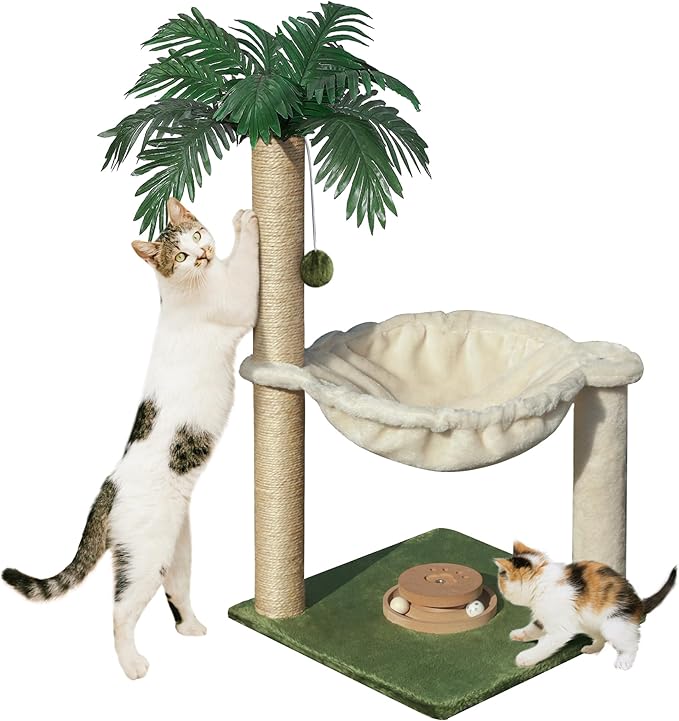 |
Cat Scratching Post 30 Inches Small Cat Tree | Check On Amazon |
 |
PETGEEK Interactive Cat Toy, Hide Mouse Cat Toy | Check On Amazon |
Conclusion
In conclusion, helping a cat achieve and maintain a healthy weight requires a multifaceted approach that begins with addressing any underlying health issues, such as hyperthyroidism, diabetes, or dental disease. Regular veterinary checkups, proper grooming, and attention to diet and nutrition play essential roles in their recovery and overall well-being. High-quality, nutrient-rich foods like kitten formulas, prescription diets, or homemade meals can support weight gain, while active play and regular deworming ensure your cat stays strong and happy. A balanced, individualized care routine, coupled with the love and attention they deserve, is the key to helping your cat thrive and enjoy a healthy, active life.

